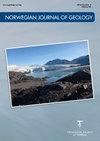Deglacial patterns and ice-sheet dynamics in the fjords of southern Nordland, Norway
IF 0.8
4区 地球科学
Q2 Earth and Planetary Sciences
引用次数: 0
Abstract
This paper presents results from glacial geomorphology mapping in and adjacent to Velfjorden and Ursfjorden in the southern Nordland region of Norway. Submarine and terrestrial landforms were studied and mapped using high-resolution multibeam bathymetric and airborne LiDAR data, in addition to reconnaissance in the field. The work unites ice-marginal deposits related to the established Tautra and Tjøtta glacial events which took place during the Younger Dryas (YD) chronozone. In Ursfjorden, an outlet glacier deposited a c. 100 m-high terminal moraine, whereas moraine ridges and a large sedimentary wedge were deposited in the inner part of Velfjorden. Highly elongated subglacial bedforms located inside the ice-marginal landforms reveal that the fjords were occupied by fast-flowing ice streams during YD. Eighteen new radiocarbon dates from the region, along with twelve recalibrated dates from previous studies, provide time-constraints for ice-sheet configuration and dynamics during deglaciation. Radiocarbon dates suggest that the outer coastal islands became ice-free prior to 14 cal ka BP. Glacially overridden shell-rich units dated to the Allerød Interstadial indicate that the YD ice sheet readvanced at least 5 km before depositing the terminal moraine in Ursfjorden. The ages of shells found near the distinct, regionally correlative, YD raised shoreline indicate that the glacial readvance culminated around early to mid-YD.在挪威北部南部峡湾的冰期模式和冰盖动力学
本文介绍了挪威北部地区南部Velfjorden和Ursfjorden及其附近冰川地貌测绘的结果。除了实地侦察外,还利用高分辨率多波束测深和机载激光雷达数据研究和绘制了海底和陆地地貌。这项工作将与年轻Dryas(YD)时区期间发生的已确定的Tautra和Tjøtta冰川事件有关的冰边缘沉积物结合在一起。在Ursfjorden,一个出口冰川沉积了一个约100米高的终端冰碛,而冰碛山脊和一个大型沉积楔沉积在Velfjorden的内部。位于冰缘地貌内的高度拉长的冰下底型表明,在YD期间,峡湾被快速流动的冰流占据。该地区的18个新的放射性碳年代,以及之前研究的12个重新校准的年代,为冰川消融期间的冰盖配置和动力学提供了时间限制。放射性碳年代表明,在14卡BP之前,外海岸岛屿就已经没有冰了。Allerød星际间的冰川覆盖富壳单元表明,YD冰盖在Ursfjorden沉积终端冰碛之前至少前进了5公里。在独特的、区域相关的YD凸起海岸线附近发现的贝壳的年龄表明,冰川的发展在YD早期至中期达到顶峰。
本文章由计算机程序翻译,如有差异,请以英文原文为准。
求助全文
约1分钟内获得全文
求助全文
来源期刊

Norwegian Journal of Geology
地学-地球科学综合
CiteScore
1.60
自引率
25.00%
发文量
0
审稿时长
>12 weeks
期刊介绍:
The Norwegian Journal of Geology publishes high-quality, fully peer-review papers from all geoscientific disciplines. Papers are commonly based on regional studies and should emphasise the development of understanding of fundamental geological processes. More specialised papers can also be submitted, but should be written in a way that is easily understood by nonspecialists, and illustrate the progress being made within that specific topic in geosciences. We also encourage initiatives for thematic issues within the scope of the Journal.
 求助内容:
求助内容: 应助结果提醒方式:
应助结果提醒方式:


